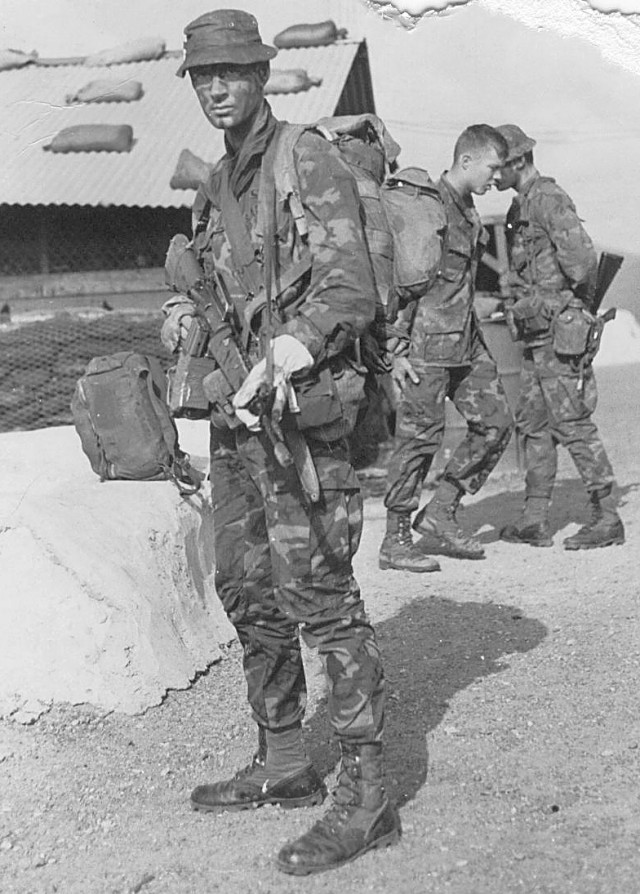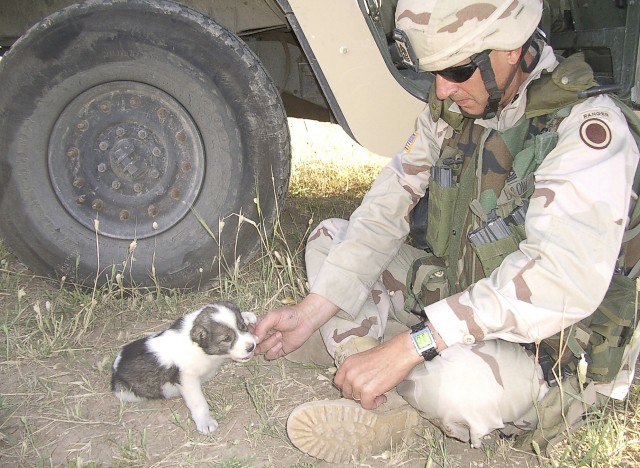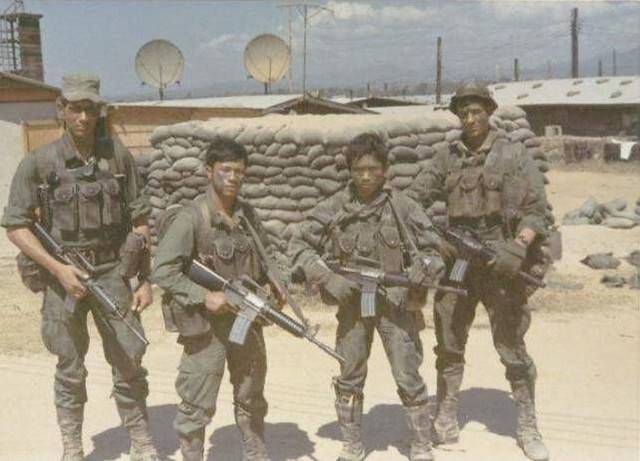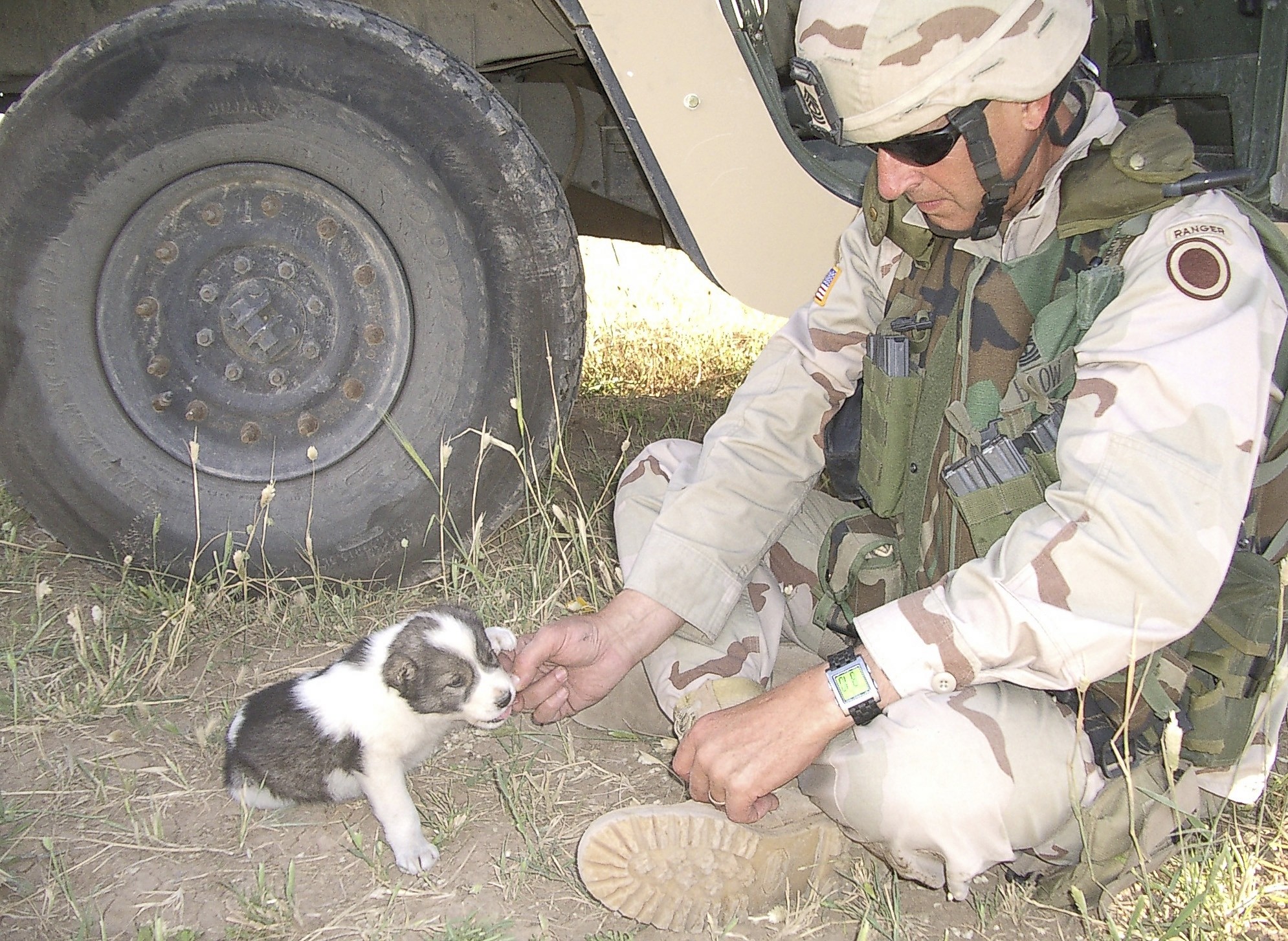FORT LEWIS, Wash. - No matter how often his country called, one old Soldier never could resist marching to the sound of guns. Whether it was Vietnam, the Balkans or Afghanistan, Master Sgt. David Blow saddled up, strapped on and hurried to the fight.
Sore knees and torn tendons didn't slow down the 57-year-old infantryman. Blow is preparing to return to Iraq with the 5th Brigade, 2nd Infantry Division.
Senior NCOs in the brigade claim he is the Army's oldest Vietnam draftee still on active duty. Despite the ironic Vietnam-era connotation that joining the National Guard was a way to avoid the fight, Blow used the Guard as a means of finding active duty units to help him get to the action.
'I want to go to war with this unit'
He had barely returned from Afghanistan in October 2006 when he marched into the office of a former colleague to ask for a job.
"He came in here and said 'I want to go to war with this unit,'" Command Sgt. Maj. Robert Prosser said. Prosser had signed for the 5th Bde., 2nd Inf. Div. headquarters building only the day before and had barely begun the process of manning and equipping the Army's newest Stryker brigade.
"I said, 'OK, slow down, come in and take a seat, because you're like No. 9 (in the brigade),'" Prosser said. "'We've got a ways to go ... We've got to build a team first.'"
Prosser put Blow to work, first on the brigade staff helping to generate the organization, then sending him to a subordinate infantry battalion as the acting command sergeant major until the official one arrived. After seven months as the 2nd Battalion, 1st Infantry Regiment's senior noncommissioned officer, Prosser pulled Blow back to be the NCO-in-charge of the brigade intelligence shop. A veteran of multiple deployments himself, Prosser said he knows the importance of the S2 NCOIC down range.
"I purposely put him in that intel position because he's been there," Prosser said. "You've got to have the right guy in your intel cell."
With 18 years of active duty, Blow re-enlisted in April to make it to 20 under the Guard's "sanctuary program," which guarantees retention to retirement. Thanks to a new three-year commitment, he is currently undergoing his first consideration for promotion to sergeant major.
More importantly to him, he also gets to return to Iraq.
Blow was the "right guy" in a number of Army environments. He grew up in Wichita, Kan. with parents who didn't dwell on military matters, though his father had served in the Marines. He never spoke of his time in uniform.
"That generation did not talk about that stuff," Blow said.
His military motivations were his own.
Drafted in college
He graduated from high school in 1969 with a scholarship to run track and cross country at Wichita State, but never did the paperwork for a student deferment from the draft.
He received his notice the next year, but talked his way into enlisting for Special Forces training, barely satisfying a requirement to be 19 and winking at another to have served at least three years in the Army before acceptance.
Once in SF training, he worried that there wouldn't be enough war left by the end of his training at Fort Bragg, so with nine friends, he terminated to get to Vietnam sooner.
The carelessness and apathy he found in the infantry line unit he joined shocked him. It was a far cry, he said, from the Army of today.
"I spent 30 days with that unit and watched 33 guys get killed or wounded with only one enemy round being fired at us and that sniper missed," he said. "It was guys watching grenades go off and shooting each other and booby traps and dumb stuff."
Drug use was common, with the enemy, he believed, indirectly supplying them.
"Drugs were a very good weapon that the Communists used against us. I don't know for a fact where the pipeline started, but I know where it ended. It ended up in the hands of GIs. Very prevalent, very cheap. Get the Soldiers high and then we had discipline problems. People doing stupid stuff."
Leads Montagnards
He re-enlisted to join the 75th Rangers, spending a year with a far more professional unit until it disbanded. He stayed in country, extending to join the 1st Special Forces Group, working out of Kontum in the Central Highlands, leading a hunter-killer team of Montagnard tribesmen in operations along the Ho Chi Minh Trail.
His 10-man team operated across the country and out to the borders of Laos and Cambodia, creating mischief for the North Vietnamese regulars equipped with the latest Soviet and Chinese technology.
He returned to the states in 1973, but the post-Vietnam Army disenchanted him.
"I couldn't stand the peace-time Army then," Blow said. "The leadership in those days wasn't very good. The Army was lacking in leadership and direction."
Among the many differences between the Army now, Blow believes is in training. He said post-Vietnam training "decentralized down to battalion, maybe even company, depending on what type of unit you were in."
Today things are very different.
"Now it's on the same sheet of music," he said. "I can go anywhere to any unit and do an infantry job and it's going to be pretty much the same job."
Blow believed in the '70s the Army continued to focus on the last war rather than the next. His experience in the Central Highlands taught him about counterinsurgency tactics.
"We never did learn our lesson in Vietnam. You can't fight an insurgent ... tactically with conventional weapons and tactics. We never lost the big battles but we lost the war because we fought the wrong way. We kept looking for the big battles."
Tries civilian life
He returned to the Ranger battalion, spending a lot of time, he said, on tarmacs waiting for calls that didn't come. He made it to Fort Lewis with the 9th Infantry Division, where he became a club manager of the 1-2-3 Club on North Fort.
He left when his active duty enlistment ended in 1981, intending to join the National Guard.
"The day I got out I went to the Guard and said I wanted to join. I was told to go to Puyallup to talk to sergeant so and so. I went there and he had a dirty, stained white T-shirt; he was fat, moustache, long hair and had a beer in his hand at 2 o'clock on a Wednesday afternoon. I told him I had made a mistake, walked out and didn't go back (for 14 years)."
He parlayed his club management experience into a civilian career setting up restaurants across Washington and later tried his hand at mortgage lending. Both were lucrative, but over the years, he missed the military life.
"You could volunteer"
In 1995, a neighbor convinced him the National Guard had drastically improved. He joined a unit headquartered down the street from his Port Orchard home and found what he was looking for. The unit was delighted to find someone with his experience.
"I found out you can pick and choose your wars," Blow said. "If your unit wasn't going to war you could volunteer and go to war. That's how I went to the Balkans and Iraq and Afghanistan and all those places."
He volunteered for every major conflict, managing a base operations staff from 2000 to 2001 in the Balkans.
"In Macedonia and Kosovo we were policemen," Blow said, "trying to keep the Muslims and Christians from killing each other."
From March 2004 to March 2005 he worked with the Kurdish Peshmerga fighters, then administered Forward Operating Base Mirez in Mosul, Iraq. Finally, he served as an imbedded tactical trainer and leader mentor in Afghanistan from June 2005 to October 2006.
Training the Afghans proved frustrating.
"They'll go through a battle drill perfectly, assault through an ambush, conduct an ambush, a raid, execute it perfectly over and over again in training. Then when they go down to do the real thing in combat, they forget everything you taught them. They just run to the sound of guns, shooting, not aiming. They're totally brave."
He found his fellow warriors extremely loyal, despite the lack of discipline in other areas.
"They will not let you get hurt," he said. "The Peshmerga did the same thing in Iraq. If we got in a fight, I never got to shoot my rifle, they would surround me. Not just three or four guys, but up to a platoon protecting me."
Back to Fort Lewis
While in Afghanistan, Blow passed 18 years of active duty, qualifying him for the sanctuary program to qualify for a 20-year retirement. When he returned to the states, he convinced Department of the Army to send him to a line unit based on his recent experience. He went directly from 525th Replacement Company to 5th Brigade to Prosser's office.
After helping the command sergeant major put out fires in the brigade headquarters, he found himself doing physical training and road marches next to his young Soldiers of 2-1 Inf. He kept up with them for months, but Lt. Col. Richard Demaree's rigorous training program finally broke down the acting command sergeant major.
"I ended up hurting myself keeping up with those kids," Blow said. "My Achilles tendons went out. I had no problems humping the mountains of Afghanistan for 18 months but pounding the pavement for two miles every day killed my Achilles and I almost came up totally lame. I had to stop."
Demaree said he was grateful for Blow's service during a time when he needed a steady senior NCO hand in the battalion.
"He truly cared about our men and made sure that our training was realistic and was preparing us for the rigors of today's combat," Demaree said.
"Whether it was a 20-mile foot-march, combat stress shooting or fieldcraft, he was right there leading by example. Despite all of the frustrations, turmoil, and stress associated with generating a new unit while simultaneously preparing it for combat as a Stryker battalion, he was always the 'glass-is-more-than-half-full' person in the room," he said.
"That was good to have as an acting battalion command sergeant major."
Intel NCOIC
For the last eight months, he has served to help craft wartime intelligence operations for the brigade.
"He was in every think tank, involved in every working group," Prosser said. "His knowledge was most appreciated ... He was the guy I needed in that position (as 2-1 Inf. senior NCO). He took it on and he ran with it. He ran with them, PT, foot marching, obstacle course. He got bumped and bruised, but he hung with it."
Blow was re-enlisted by the brigade commander, Col. Harry D. Tunnell, on April 16. He spoke soon afterward about today's Army, but in terms that seemed to apply to himself.
"Leadership today is so much better focused. They want to be here," he said. "Back then it was a lot of people wanted to be there but it seemed like a lot of the people were doing it because their dad was a Soldier, a career Soldier, and they were doing it because it was a job.
"With a lot of the leadership today, it's not just a job, it's a life," Blow said. "It's their calling, what they're doing because they want to. It's the patriotic thing to do."
Don Kramer is a reporter with Fort Lewis' Northwest Guardian






Social Sharing